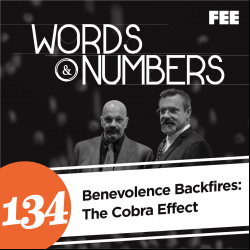Archive for the ‘Behavioral Economics’ Category
Link: https://wordsandnumbers.libsyn.com/benevolence-backfires-the-cobra-effect
Sometimes laws with good intentions have unforeseen results that end up hurting the people they were meant to protect. James Harrigan and Antony Davies discuss the cobra effect and how government policy decisions bring about unintended consequences.
Original Air Date: September 4, 2019
Length: 33 Minutes 15 Seconds
Link: https://www.npr.org/2021/08/23/1030276615/planet-money-summer-school-5-bubbles-bikes-biases
Learn from Planet Money’s Summer School what causes financial bubbles with examples such as the dotcom bubble and the Great British bicycle bubble. Also, hear about how behavioral biases, greater fools theory, and herd behavior make bubbles much worse.
Original Air Date: August 25, 2021
Length: 29 Minutes 57 Seconds
Link: https://www.economist.com/podcasts/2021/03/18/how-can-successful-women-help-their-successors-through-the-glass-ceiling
With the passing of one year mark for the COVID-19 pandemic, we are seeing record numbers of women leaving the workforce. Looking toward the future, women in senior positions want to make sure that the advancements that women have made in the workforce do not regress. Anne McElvoy, of the Economist talks with Joanna Coles, CEO of Northern Star Investments and former chief content officer of Hearst magazines, and Melora Hardin star of “The Bold Type” and “The Office” about how executive women are portrayed in media. They also discuss how limited work-life balance and discrimination that women face affect their day to day lives. The discussion encompasses many issues that women have continued to endure, which is very important as we continue to move through International Women’s Month.
Original Air Date: March 18, 2021
Length: 30 minutes 38 seconds
Link: https://www.npr.org/2021/02/08/965572857/the-power-of-humor
The Indicator discusses the value of humor in life. They invite Jennifer Aaker and Naomi Bagdonas, Stanford Business School faculty, to discuss their book new Humor, Seriously which highlights the importance of humor within the workplace. They consider all of the utility gained through the incorporation of humor into work such as increased productivity and satisfaction, as well as tips on how to add in humor to your workday.
Original Air Date: February 8, 2021
Length: 8 minutes 46 seconds
Link: https://www.npr.org/2020/10/12/923123253/an-economist-walks-into-a-bar
This podcast discusses how many groundbreaking ideas were discovered at bars and how they could potentially foster innovation. Individuals like Mike Andrews have researched this through studying the number of patents filed during Prohibition. Andrews found that innovation is mainly sparked through connections made with other individuals. As seen with the Covid-19 pandemic, individuals are still finding remote ways to foster innovation through technologies like Zoom.
Original Air Date: October 12,2020
Length: 9 minutes 59 seconds
Link: https://www.marketplace.org/shows/marketplace/the-holiday-shopping-season-is-already-here/
About 100,000 businesses have had to shut down due to Covid-19, and the ones who have survived have had to change many aspects of product promotion. This is in part due to the changes we have seen in consumer behavior because of the pandemic. One way companies are adapting is by starting to sell for holidays now to combat the economic blow they have suffered because of Covid-19 and to make sure there are no shortages of products once the holidays arrive.
Original Air Date: October 12, 2020
Length: 28 minutes, 22 seconds
Discussion Prompt 1: What other ways have you seen businesses adapt to the impacts of Covid-19?
Discussion Prompt 2: Do you think Covid-19 will permanently alter the way consumers behave? If so, how? What about businesses?
Link: https://www.npr.org/2020/08/07/900273012/mask-communication
This podcast uses behavioral economics to analyze the reasons why people may refuse to wear masks. Economists believe when these individuals feel external constraints on their freedoms, they feel even less inclined to wear a mask. Behavioral economists discuss nudges/incentives that could be effective in this situation.
Original Air Date: August 7, 2020
Length: 26 minutes 26 seconds
Discussion Prompt: What are some other incentives you can think of that would influence more widespread mask wearing?
 Link: http://www.npr.org/2017/09/18/551901221/we-shouldn-t-stick-our-heads-in-the-sand-but-we-do-it-anyway
Link: http://www.npr.org/2017/09/18/551901221/we-shouldn-t-stick-our-heads-in-the-sand-but-we-do-it-anyway
Summary: We all have experienced information aversion when it comes to information that provokes psychological pain. When the stock market crashes, do you continue to frequently check your portfolio, or ignore it completely since you anticipate future losses? If you chose to put your portfolio to the side, this exemplifies “the ostrich effect”. This term comes from not birds, but investors. Hidden Brain discusses how information aversion is associated with people avoiding information that is unpleasant. While we know that ignorance can be bliss, knowledge is power.
Original Air Date: September 18, 2017
Length: 26 minutes 41 seconds
 Link: http://www.npr.org/sections/money/2017/03/31/522226226/episode-762-the-fine-print
Link: http://www.npr.org/sections/money/2017/03/31/522226226/episode-762-the-fine-print
Summary: Everybody at one point in their life has heard the term “Got to read the fine print”. But what does that actually mean? Planet Money tells stories about what happens when you read the fine print, and how you can make money from it.
Original Air Date: March 31, 2017
Length: 19 minutes 32 seconds
 Link: http://www.npr.org/sections/money/2016/02/17/467108611/episode-684-the-return-of-the-colonel
Link: http://www.npr.org/sections/money/2016/02/17/467108611/episode-684-the-return-of-the-colonel
Summary: Colonel Sanders passed away years ago, which began the strained relationship between KFC Corporate and the KFC Franchises. After a disastrous Oprah segment leading to a free giveaway, the relationship hit rock bottom. Planet Money discusses how re-introducing Colonel Sanders (the character), led to happier franchises and more sales for corporate.
Original Air Date: February 17, 2016
Length: 15 minutes 2 seconds







 Link:
Link: 
